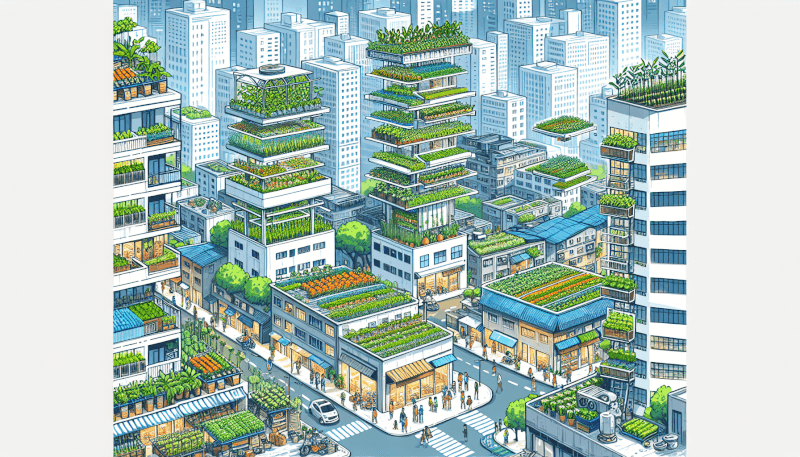Imagine a future where cities are transformed into lush green landscapes, where fresh fruits and vegetables are grown right around the corner from your apartment building. This is the vision of urban farming, a revolutionary concept that not only brings food production closer to the people, but also holds the potential to combat climate change in a remarkable way. By utilizing empty spaces, rooftops, and even vertical structures, urban farming reduces carbon emissions, conserves water, and promotes biodiversity. In this article, we will explore the fascinating ways in which urban farming contributes to the fight against climate change and how it paves the way for a more sustainable future for our cities and planet.
Reduced Food Transport Emissions
Urban farming plays a crucial role in reducing food transport emissions. By cultivating and harvesting food locally, the need for long-distance transportation is greatly reduced. Traditional agriculture often involves transporting food over long distances, which results in significant greenhouse gas emissions from vehicles. In contrast, urban farming brings food production closer to consumers, minimizing the distance food needs to travel. This not only reduces carbon emissions but also decreases the reliance on fossil fuels for transportation.
Decreased Need for Land Conversion
Another benefit of urban farming is the decreased need for land conversion. As urban areas continue to expand, agricultural land is often converted into residential or commercial spaces to meet the growing demand. However, this conversion of land comes at a cost to the environment, leading to deforestation and habitat destruction. Urban farming utilizes existing urban spaces, such as rooftops, vacant lots, or vertical structures, to grow food, eliminating the necessity to convert more land. By preserving agricultural land, urban farming helps to maintain biodiversity and protect ecosystems.
Mitigation of Food Waste
Food waste is a significant contributor to greenhouse gas emissions. When food is thrown away and sent to landfills, it decomposes and releases methane, a potent greenhouse gas. Urban farming can help mitigate this issue by reducing food waste. By growing food locally, farmers can harvest crops when they are ripe and distribute them directly to local consumers. This reduces the reliance on long supply chains and minimizes opportunities for food spoilage or expiration. Additionally, urban farmers can implement composting systems to recycle organic waste and turn it into nutrient-rich soil, closing the loop and reducing methane emissions further.

Enhanced Carbon Sequestration
Urban farming contributes to enhanced carbon sequestration, which helps to mitigate climate change. Plants absorb carbon dioxide from the atmosphere through photosynthesis, storing the carbon in their roots, stems, and leaves. By incorporating green spaces and growing food within urban areas, urban farming increases the number of plants and vegetation, ultimately enhancing carbon sequestration. This additional carbon storage helps to offset the carbon emissions from various human activities, making urban farming a valuable tool in the fight against climate change.
Promotes Biodiversity and Protects Ecosystems
Urban farming promotes biodiversity and protects ecosystems by providing habitats for various plant and animal species. In urban environments where green spaces are limited, urban farming can create pockets of biodiversity, attracting pollinators, birds, and beneficial insects. By using organic farming practices and avoiding harmful pesticides, urban farmers create a safe haven for wildlife and encourage the presence of diverse plant species. This biodiversity not only enriches the urban environment but also supports the overall health of ecosystems by providing food and shelter for a range of species.

Conservation of Water Resources
Water scarcity is a pressing issue in many parts of the world, and urban farming contributes to the conservation of water resources. Through practices such as drip irrigation and hydroponics, which deliver water directly to plant roots, urban farmers can minimize water wastage. Additionally, urban farming can utilize rainwater harvesting techniques, capturing and storing rainwater for irrigation purposes. By efficiently managing water resources, urban farming reduces the strain on local water supplies and promotes sustainable water usage.
Improvement of Urban Air Quality
Urban farming plays a role in improving urban air quality, which is often compromised by pollution from various sources. Plants help to filter pollutants from the air by absorbing harmful chemicals and releasing oxygen. By incorporating green spaces and rooftop gardens, urban farming increases the number of plants in urban areas. These plants act as natural air purifiers, reducing the levels of pollutants and improving air quality for both humans and wildlife. Furthermore, urban farming can reduce the need for pesticide use, minimizing the release of harmful chemicals into the air.

Enhancement of Energy Efficiency
Urban farming contributes to the enhancement of energy efficiency in food production. Traditional agriculture relies heavily on machinery and fossil fuels, consuming significant amounts of energy. In contrast, urban farming often adopts sustainable and energy-efficient practices. For instance, vertical farming structures use LED lights to provide plants with the necessary light for growth, which consumes less energy compared to conventional lighting systems. Furthermore, urban farmers can implement innovative technologies such as aquaponics or aeroponics systems, which require less water and energy than traditional farming methods. By reducing energy consumption, urban farming helps to decrease greenhouse gas emissions and mitigate climate change.
Reduction of Heat Island Effect
Urban areas are known for the heat island effect, where cities experience higher temperatures than surrounding rural areas due to the abundance of concrete and lack of green spaces. Urban farming can play a pivotal role in reducing the heat island effect. By introducing green spaces, rooftop gardens, and vertical farms, urban farming helps to cool down urban environments. Vegetation provides shade and evaporative cooling, reducing the overall temperature and creating a more pleasant and comfortable environment for city dwellers. Through its contribution to the reduction of the heat island effect, urban farming enhances the livability and sustainability of urban areas.

Creation of Green Jobs
Urban farming has the potential to create green jobs and contribute to the development of a sustainable economy. By establishing urban farms, more job opportunities are generated, ranging from farmers and agricultural workers to distribution and marketing roles. These jobs contribute to the local economy and provide employment opportunities, particularly in areas with high rates of unemployment or underemployment. Additionally, urban farming can foster entrepreneurship and innovation, as individuals explore new methods and technologies for sustainable food production. The creation of green jobs through urban farming not only benefits individuals and communities but also contributes to a more sustainable and resilient society.

